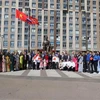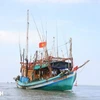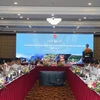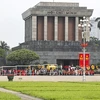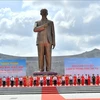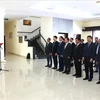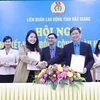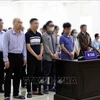The second Summit of the Mekong River Commission (MRC), scheduled for April 5 in Ho Chi Minh City, will help enhance relations among member countries as well as draw attention and support from partners and the international community.
The event will take place in the context of high population pressure and increasing demand for development in the Mekong River Basin, including hydropower projects in the river’s main stream and branches, irrigation projects, fishing activities and waterway transport.
The summit will continue to represent the will and political commitment of MRC member countries’ leaders to enhance regional affiliation in overcoming all challenges towards the sustainable development of the basin.
Themed “Cooperation for Water, Energy and Food Security in Transboundary Basins under a Changing Climate”, the meeting aims to inspire the highest commitment of member states to regional cooperation in the area.
It will also define priority areas for the MRC in the immediate future, especially in ensuring water, energy and food security and lessening the impacts of climate change.
The MRC was set up in Chieng Rai , Thailand on April 5, 1995 with four member countries, namely Laos , Cambodia , Thailand and Vietnam . Its main objective is to foster cooperation among member states in using, developing and protecting water and other related resources in a sustainable manner, for their common interests and the welfare of people in the basin.
Right after the MRC’s establishment, member countries signed the Agreement on Cooperation for the Sustainable Development of the Mekong River Basin (1995 Mekong Agreement), highlighting a basic principle in cooperation among them of consensus, equality and respect for territorial sovereignty.
The agreement is an important legal framework for Vietnam to protect its interests in the Cuu Long (Mekong Delta) and Tay Nguyen ( Central Highlands ) regions.
The country has seriously followed the Mekong Agreement, actively participated in addressing contradictions within the MRC, and greatly contributed to the commission’s programmes.
Over the past 19 years, the MRC has recorded many achievements in promoting basin cooperation, including the building of regulations on water use, environmental management and waterway connection. It has also expanded relations with partners in and out of the region such as China and Myanmar .
The first MRC Summit in Hua Hin, Thailand on April 5, 2010 adopted the Hua Hin Statement, which reviewed 15 years of Mekong cooperation, highlighted challenges and opportunities for the basin, and affirmed the MRC vision and necessary actions to reach it.-VNA
The event will take place in the context of high population pressure and increasing demand for development in the Mekong River Basin, including hydropower projects in the river’s main stream and branches, irrigation projects, fishing activities and waterway transport.
The summit will continue to represent the will and political commitment of MRC member countries’ leaders to enhance regional affiliation in overcoming all challenges towards the sustainable development of the basin.
Themed “Cooperation for Water, Energy and Food Security in Transboundary Basins under a Changing Climate”, the meeting aims to inspire the highest commitment of member states to regional cooperation in the area.
It will also define priority areas for the MRC in the immediate future, especially in ensuring water, energy and food security and lessening the impacts of climate change.
The MRC was set up in Chieng Rai , Thailand on April 5, 1995 with four member countries, namely Laos , Cambodia , Thailand and Vietnam . Its main objective is to foster cooperation among member states in using, developing and protecting water and other related resources in a sustainable manner, for their common interests and the welfare of people in the basin.
Right after the MRC’s establishment, member countries signed the Agreement on Cooperation for the Sustainable Development of the Mekong River Basin (1995 Mekong Agreement), highlighting a basic principle in cooperation among them of consensus, equality and respect for territorial sovereignty.
The agreement is an important legal framework for Vietnam to protect its interests in the Cuu Long (Mekong Delta) and Tay Nguyen ( Central Highlands ) regions.
The country has seriously followed the Mekong Agreement, actively participated in addressing contradictions within the MRC, and greatly contributed to the commission’s programmes.
Over the past 19 years, the MRC has recorded many achievements in promoting basin cooperation, including the building of regulations on water use, environmental management and waterway connection. It has also expanded relations with partners in and out of the region such as China and Myanmar .
The first MRC Summit in Hua Hin, Thailand on April 5, 2010 adopted the Hua Hin Statement, which reviewed 15 years of Mekong cooperation, highlighted challenges and opportunities for the basin, and affirmed the MRC vision and necessary actions to reach it.-VNA

